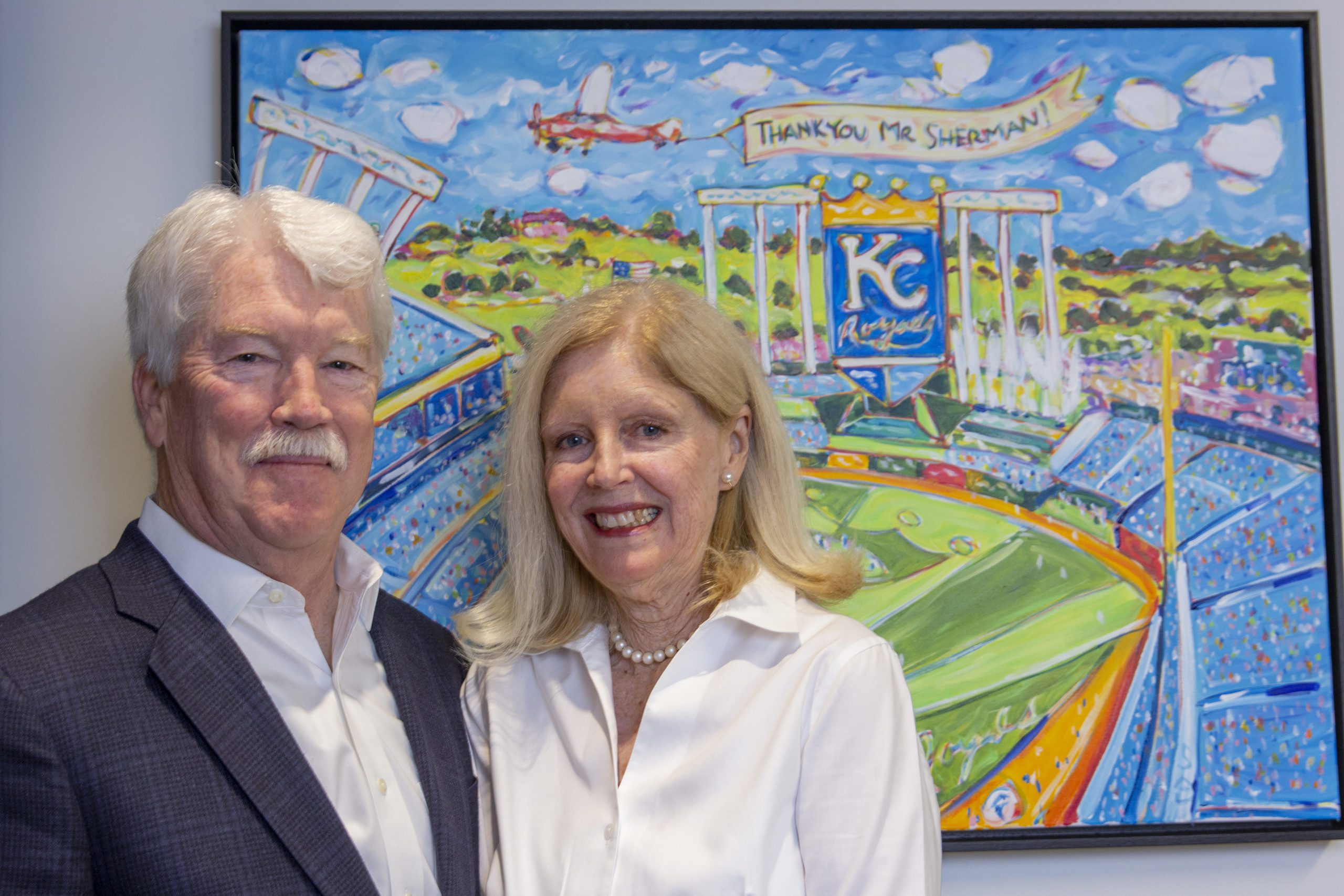IN THE SPOTLIGHT: John Sherman, on Boca Grande and the Kansas City Royals

John Sherman loves baseball. He played ball as a kid and dreamed of being in the big leagues one day. His dream came true, in a manner of speaking. He is not a player, but he is principal owner of the Kansas City Royals – the big leagues for sure.
John spends much of his off time in Boca Grande, enjoying being “unplugged” and close to the beach and beautiful sunsets. He and his wife Marny came to Boca Grande about 15 years ago, after exploring other barrier islands in the area. When they reached Boca Grande, their search for paradise came to a happy end. “When our kids were young we started coming to Southwest Florida for spring break, sometimes holidays.” he said. “We would rent, but my wife loves this place. So now we’ve become very attached.” When he says Marny loves the place, it is a very emphatic statement. He credits her with the decision to make this their home away from home, but his connection to Boca Grande is strong, as well.
“What’s not to like! Did you see the ocean today? It’s beautiful, it’s calm this week, the sunsets have been breathtaking. I have a very busy life, so just having the ability to come down here and unplug has been just great,” he said. “And the people … I also feel that the community here is just great. I think it has shown that during this period we have gone through and are still going through,” he said, referring to how the community has come together so solidly after Hurricane Ian.
He is grateful that his home was spared serious damage. “We were very, very lucky and blessed,” he said.
He and Marny came to the Island about 10 days after the storm and saw the devastation but they are thrilled with the recovery.
“We try to take a walk every day,” he said. “When we were first here after the storm it was so sad, but coming back now, it is so much greener, things are really coming back. Everything here is so resilient.”
When they are not in Boca Grande, John and Marny live in Kansas City, Mo. She is a native of the city, while John adopted it as his town right after college, when he secured his first job there. He met Marny there and that his been home ever since. John and Marny have five grown children, all of whom have a real attachment to Boca Grande. “They are all different. They all are carving their own way,” he said.
John explained how he carved his way into the baseball business.
“I started a couple of businesses in the energy sector, and I grew those. I took one public and I sold one. In 2013 I sold control of that company. I’m still on the board of that company, but I walked away from being a full time CEO, so I needed something to do, besides just go to Boca Grande.
“I started to visit with some people in the (professional sports) business,” he continued. “and I have a friend from Kansas City that was involved in the NBA and he’s part of our ownership group now. Then I talked to the former owner of the Kansas City Royals, David Glass, and I actually got involved with the Cleveland Indians, now the Guardians, and that was a great experience. When the Glass family decided to sell the team (The Royals), they called me and, in the spring of 2019, said ‘If you can put together a group, you’ll get first shot.’ So that was very exciting.”
He was able to put a group together, and the deal was made.
“I love sports and I have enjoyed my business career, so it’s a business, but it’s also a great community asset,” he said. “These franchises are really important to the community. They are platforms for doing good in a community, so that really lines up with Marny’s and my philanthropy. I saw it as another way to give back to the community.”
He continued.
“We want to win; we want to compete. That part is a lot of fun, but it’s an interesting and fascinating business for a challenge. And then, the community aspect of it was very important to me, personally, as well as to all the others in the ownership group.”
Under all that, though, is the love of baseball. “Major league baseball is kind of my job and my hobby. I grew up loving sports, playing and being a participant in sports. I love the game.”
John goes to almost all the home games and admits he thinks about the team all the time, morning until night. “Right now, in less than a month spring training starts,” he said. “So there’s a lot going on right now.”
Some of the joy of the game is that each year the slate is wiped clean. “I always feel like, from a baseball perspective, everybody’s undefeated. Everybody’s optimistic about their own team. It may be realistic that your team’s not ready, or you still need some things before you’re ready to contend, but hope springs eternal this time of year in baseball.”
He loves the excitement of seeing the rookies show up and take to the field each year.
“These young men who take the field – they are incredibly talented athletes. And it’s an incredibly challenging sport that they play. My job is to try to help them or make resources available to our staff to help us compete,” he said.
It is not only the games, the excitement and the community involvement that John loves. It is even the pace of the sport and its changing seasons.
“One thing about the cycle of baseball, you get the holidays off! The players and the coaches, they really enjoy the holidays, and once the holidays are over they are all back to work. They’re getting ready. The big trucks are already being packed to go to Arizona (for spring training),” he noted.
The game’s pace is something John is keenly aware of from a business perspective, as well. Some, especially younger fans, would like to see the games go more quickly and have more action, so rule changes are in the offing, he said.
“I don’t mind watching a long baseball game because I love the game; I don’t mind watching a 1-0 game but younger people want more action, they want a faster pace, so we’re making some changes this year that we think will help that.”
The “active pitch clock” is one of those changes. It will dictate the pace of the pitching. The time it takes for a pitcher to release the ball is totally unregulated now, he explained. “The pitcher can tie his shoes three times, and some work pretty slow,” he said.
The new rule will regulate the time, and move the game along much more rapidly. Another change will be bigger bases, which will improve safety, as well as encourage more stolen bases and more in-field hits, John explained. There will be other changes, as well, which are already being tested out in the minor leagues and will be put into practice for the Majors during spring training.
“Fans want balls in play and they want action,” John said. “The three favorite plays in baseball, from a fan’s perspective, are the triple, the double and the stolen base. It’s the uncertainty of it. When the ball goes out of the park everybody cheers, but they know what happened. But when the ball goes down the gap and the runner is there, it’s much more exciting. So we’re trying to make it more exciting, faster paced, both in length of play and pace of play.”
A New Stadium
John is proud of the stadium the Royals play in, part of the Harry S. Truman Sports Complex. It famously has both baseball and football stadiums side-by-side, with the baseball side known as the Kauffman Stadium. That complex is nearing its 50-year mark and plans are underway to build a new stadium.
“We have to think about the future” he said. “It’s a little bit down the road, but we are certainly starting to do the exploratory discussions with real estate people and public officials. Our lease goes to 2030, so we have to get something done by then, but it could be earlier than that. We are just in the early stages. A big project like that will take three or four years to design and build anyway, but you can’t start too early because if you wait too long problems can occur.”
When he thinks about the objectives for this team, John said, it is “to win on the field and compete for a championship on behalf of our fans.” But it’s also to secure their future in Kansas City, and he feels their long-term home will be a part of that. “It’s probably the biggest decision we’ll make during the time we have the privilege of stewarding this team … to use this platform to do good in the community.”
John said he has nostalgic feelings for the old stadium, as do many people. He said it is the fourth oldest stadium in baseball, which is both good and bad. He also noted that they have done a good job keeping the old stadium current and as modern as an old building can be, but it looks like a new stadium will be the best choice for the future.
“Moving it (where they play) and developing around it, will create more opportunities for economic growth, economic activity, beyond just the 81 nights a year. I talk to our fans all the time about that. There’s a lot of nostalgia about that and I have it myself. My wife and I were there when we won the World Series in 1985. I have that same attachment, so I do understand it, but it’s a complicated decision, and it is really, really important for the long term future of the franchise.”
John has been recognized with numerous honors for his business, civic and philanthropic leadership in the city. In 2013 he was awarded an honorary doctorate by the University of Missouri-Kansas City’s School of Education for his work in urban education. The following year he was inducted into the inaugural class of the Bloch School of Business Entrepreneur’s Hall of Fame. The list of honors goes on.
Their philanthropy is generally focused around economics – families with higher economic needs, who have bright kids who have big dreams for themselves. Every child deserves the opportunity to be prepared for and have access to a good education, but John knows that’s not where we are right now. “If we can chip away at it, we’ll see real change. Education is probably the best thing we can invest in to try to help communities long term.”









